Analyzing the Legality of 'Continue to Pay' Arrangement in Hire Purchase Agreements
VerifiedAdded on 2023/06/15
|16
|5272
|141
AI Summary
This article discusses the Hire Purchase Act, 1967 and the legality of 'continue to pay' arrangement in hire purchase agreements. It suggests better solutions for hirers to avoid breaching the statutory act and the drawn hire purchase agreement.
Contribute Materials
Your contribution can guide someone’s learning journey. Share your
documents today.
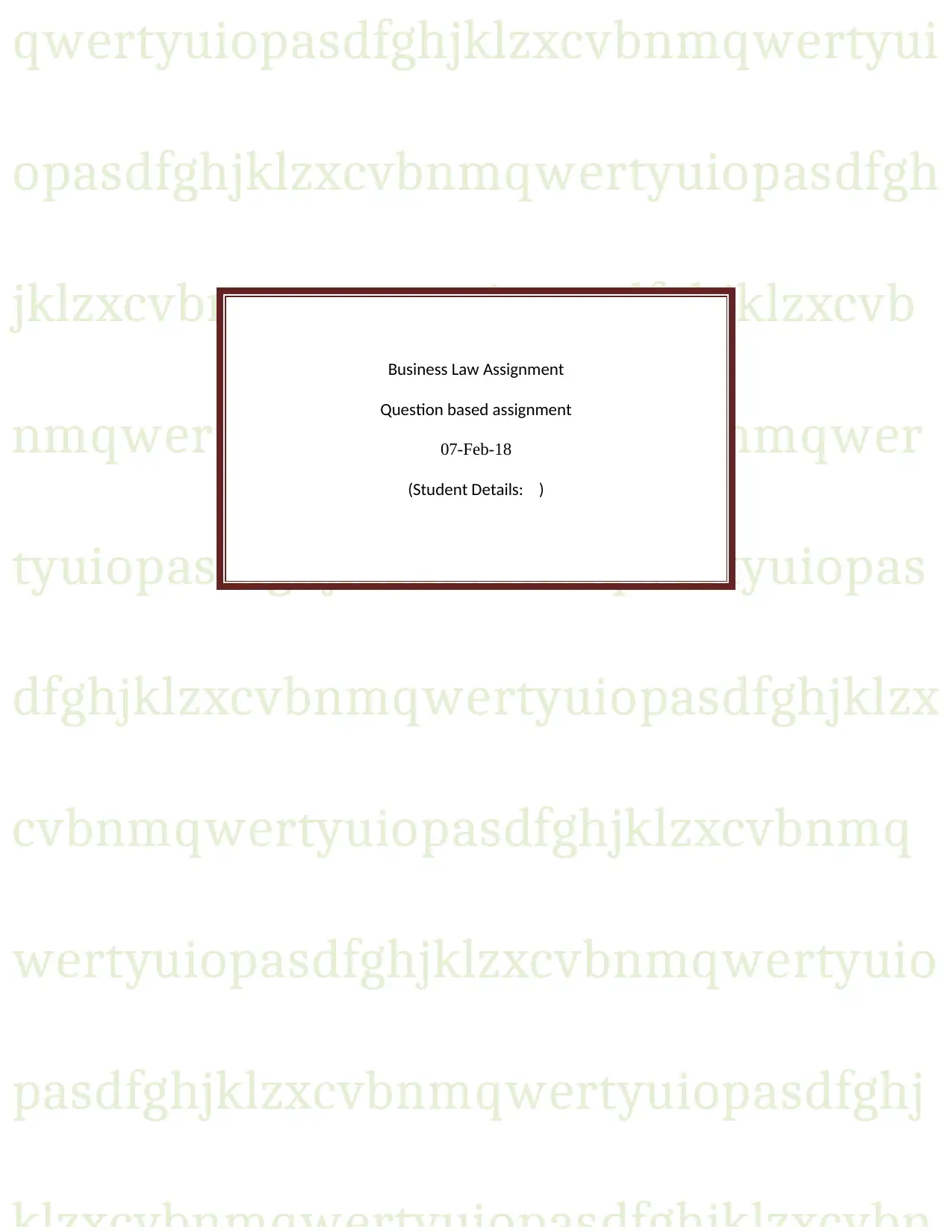
qwertyuiopasdfghjklzxcvbnmqwertyui
opasdfghjklzxcvbnmqwertyuiopasdfgh
jklzxcvbnmqwertyuiopasdfghjklzxcvb
nmqwertyuiopasdfghjklzxcvbnmqwer
tyuiopasdfghjklzxcvbnmqwertyuiopas
dfghjklzxcvbnmqwertyuiopasdfghjklzx
cvbnmqwertyuiopasdfghjklzxcvbnmq
wertyuiopasdfghjklzxcvbnmqwertyuio
pasdfghjklzxcvbnmqwertyuiopasdfghj
Business Law Assignment
Question based assignment
07-Feb-18
(Student Details: )
opasdfghjklzxcvbnmqwertyuiopasdfgh
jklzxcvbnmqwertyuiopasdfghjklzxcvb
nmqwertyuiopasdfghjklzxcvbnmqwer
tyuiopasdfghjklzxcvbnmqwertyuiopas
dfghjklzxcvbnmqwertyuiopasdfghjklzx
cvbnmqwertyuiopasdfghjklzxcvbnmq
wertyuiopasdfghjklzxcvbnmqwertyuio
pasdfghjklzxcvbnmqwertyuiopasdfghj
Business Law Assignment
Question based assignment
07-Feb-18
(Student Details: )
Secure Best Marks with AI Grader
Need help grading? Try our AI Grader for instant feedback on your assignments.
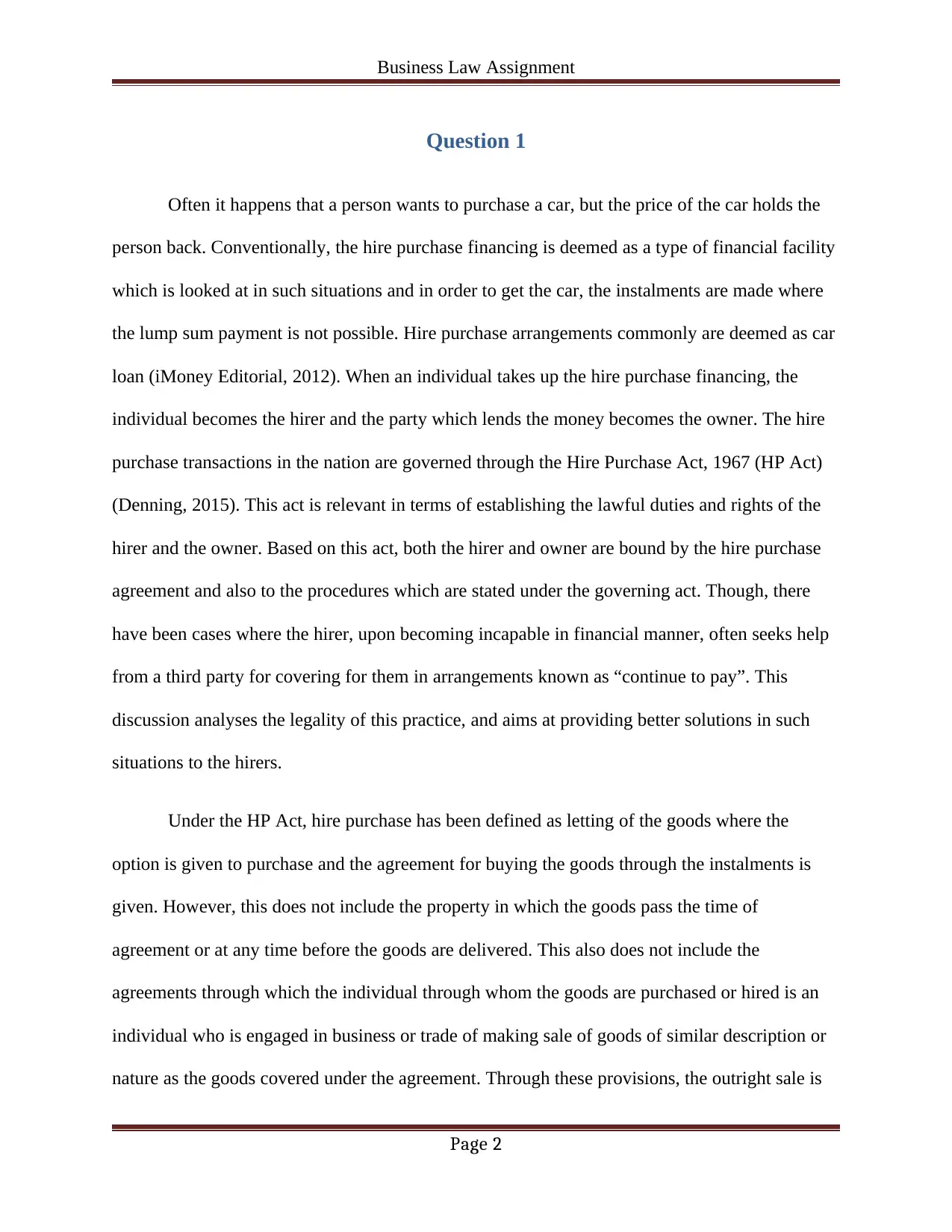
Business Law Assignment
Question 1
Often it happens that a person wants to purchase a car, but the price of the car holds the
person back. Conventionally, the hire purchase financing is deemed as a type of financial facility
which is looked at in such situations and in order to get the car, the instalments are made where
the lump sum payment is not possible. Hire purchase arrangements commonly are deemed as car
loan (iMoney Editorial, 2012). When an individual takes up the hire purchase financing, the
individual becomes the hirer and the party which lends the money becomes the owner. The hire
purchase transactions in the nation are governed through the Hire Purchase Act, 1967 (HP Act)
(Denning, 2015). This act is relevant in terms of establishing the lawful duties and rights of the
hirer and the owner. Based on this act, both the hirer and owner are bound by the hire purchase
agreement and also to the procedures which are stated under the governing act. Though, there
have been cases where the hirer, upon becoming incapable in financial manner, often seeks help
from a third party for covering for them in arrangements known as “continue to pay”. This
discussion analyses the legality of this practice, and aims at providing better solutions in such
situations to the hirers.
Under the HP Act, hire purchase has been defined as letting of the goods where the
option is given to purchase and the agreement for buying the goods through the instalments is
given. However, this does not include the property in which the goods pass the time of
agreement or at any time before the goods are delivered. This also does not include the
agreements through which the individual through whom the goods are purchased or hired is an
individual who is engaged in business or trade of making sale of goods of similar description or
nature as the goods covered under the agreement. Through these provisions, the outright sale is
Page 2
Question 1
Often it happens that a person wants to purchase a car, but the price of the car holds the
person back. Conventionally, the hire purchase financing is deemed as a type of financial facility
which is looked at in such situations and in order to get the car, the instalments are made where
the lump sum payment is not possible. Hire purchase arrangements commonly are deemed as car
loan (iMoney Editorial, 2012). When an individual takes up the hire purchase financing, the
individual becomes the hirer and the party which lends the money becomes the owner. The hire
purchase transactions in the nation are governed through the Hire Purchase Act, 1967 (HP Act)
(Denning, 2015). This act is relevant in terms of establishing the lawful duties and rights of the
hirer and the owner. Based on this act, both the hirer and owner are bound by the hire purchase
agreement and also to the procedures which are stated under the governing act. Though, there
have been cases where the hirer, upon becoming incapable in financial manner, often seeks help
from a third party for covering for them in arrangements known as “continue to pay”. This
discussion analyses the legality of this practice, and aims at providing better solutions in such
situations to the hirers.
Under the HP Act, hire purchase has been defined as letting of the goods where the
option is given to purchase and the agreement for buying the goods through the instalments is
given. However, this does not include the property in which the goods pass the time of
agreement or at any time before the goods are delivered. This also does not include the
agreements through which the individual through whom the goods are purchased or hired is an
individual who is engaged in business or trade of making sale of goods of similar description or
nature as the goods covered under the agreement. Through these provisions, the outright sale is
Page 2
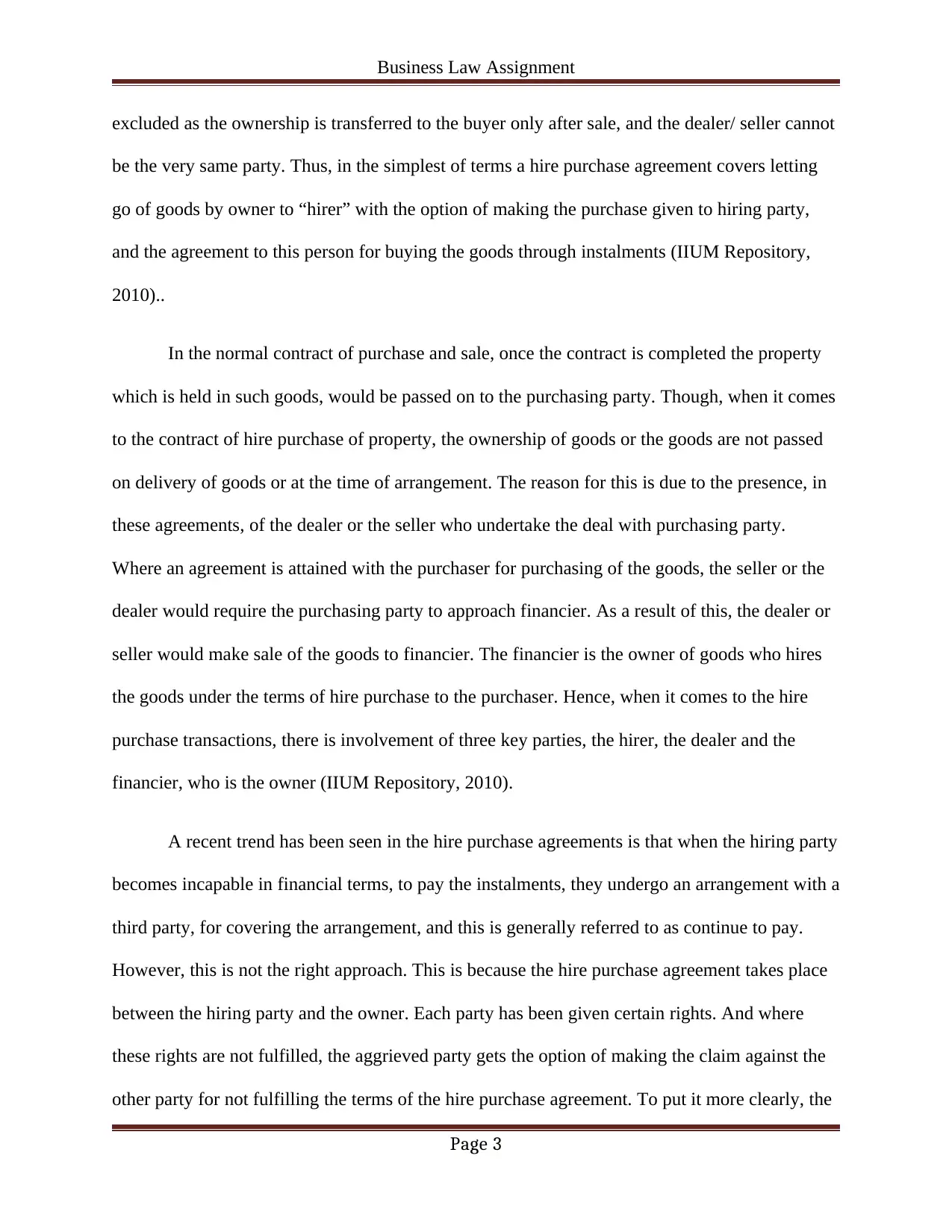
Business Law Assignment
excluded as the ownership is transferred to the buyer only after sale, and the dealer/ seller cannot
be the very same party. Thus, in the simplest of terms a hire purchase agreement covers letting
go of goods by owner to “hirer” with the option of making the purchase given to hiring party,
and the agreement to this person for buying the goods through instalments (IIUM Repository,
2010)..
In the normal contract of purchase and sale, once the contract is completed the property
which is held in such goods, would be passed on to the purchasing party. Though, when it comes
to the contract of hire purchase of property, the ownership of goods or the goods are not passed
on delivery of goods or at the time of arrangement. The reason for this is due to the presence, in
these agreements, of the dealer or the seller who undertake the deal with purchasing party.
Where an agreement is attained with the purchaser for purchasing of the goods, the seller or the
dealer would require the purchasing party to approach financier. As a result of this, the dealer or
seller would make sale of the goods to financier. The financier is the owner of goods who hires
the goods under the terms of hire purchase to the purchaser. Hence, when it comes to the hire
purchase transactions, there is involvement of three key parties, the hirer, the dealer and the
financier, who is the owner (IIUM Repository, 2010).
A recent trend has been seen in the hire purchase agreements is that when the hiring party
becomes incapable in financial terms, to pay the instalments, they undergo an arrangement with a
third party, for covering the arrangement, and this is generally referred to as continue to pay.
However, this is not the right approach. This is because the hire purchase agreement takes place
between the hiring party and the owner. Each party has been given certain rights. And where
these rights are not fulfilled, the aggrieved party gets the option of making the claim against the
other party for not fulfilling the terms of the hire purchase agreement. To put it more clearly, the
Page 3
excluded as the ownership is transferred to the buyer only after sale, and the dealer/ seller cannot
be the very same party. Thus, in the simplest of terms a hire purchase agreement covers letting
go of goods by owner to “hirer” with the option of making the purchase given to hiring party,
and the agreement to this person for buying the goods through instalments (IIUM Repository,
2010)..
In the normal contract of purchase and sale, once the contract is completed the property
which is held in such goods, would be passed on to the purchasing party. Though, when it comes
to the contract of hire purchase of property, the ownership of goods or the goods are not passed
on delivery of goods or at the time of arrangement. The reason for this is due to the presence, in
these agreements, of the dealer or the seller who undertake the deal with purchasing party.
Where an agreement is attained with the purchaser for purchasing of the goods, the seller or the
dealer would require the purchasing party to approach financier. As a result of this, the dealer or
seller would make sale of the goods to financier. The financier is the owner of goods who hires
the goods under the terms of hire purchase to the purchaser. Hence, when it comes to the hire
purchase transactions, there is involvement of three key parties, the hirer, the dealer and the
financier, who is the owner (IIUM Repository, 2010).
A recent trend has been seen in the hire purchase agreements is that when the hiring party
becomes incapable in financial terms, to pay the instalments, they undergo an arrangement with a
third party, for covering the arrangement, and this is generally referred to as continue to pay.
However, this is not the right approach. This is because the hire purchase agreement takes place
between the hiring party and the owner. Each party has been given certain rights. And where
these rights are not fulfilled, the aggrieved party gets the option of making the claim against the
other party for not fulfilling the terms of the hire purchase agreement. To put it more clearly, the
Page 3
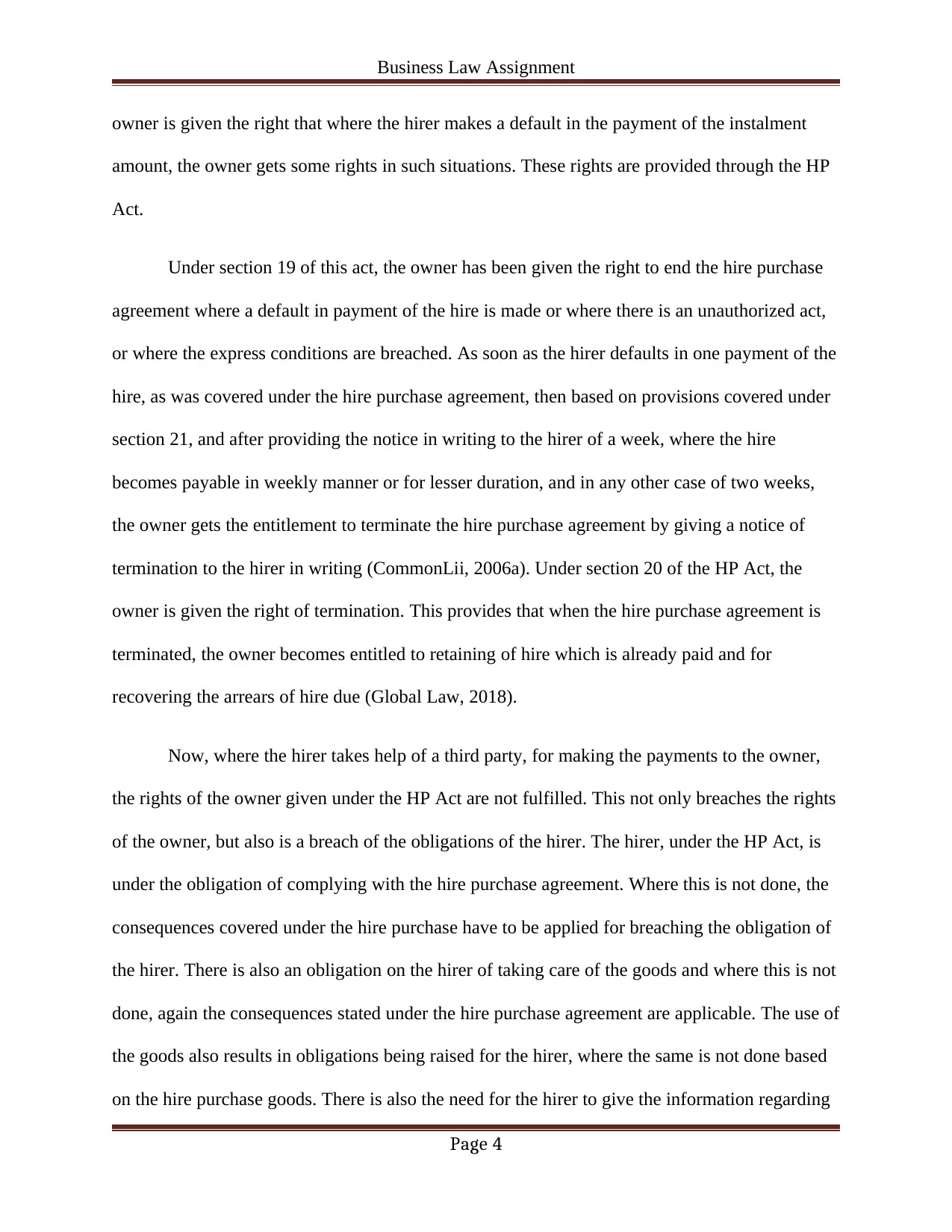
Business Law Assignment
owner is given the right that where the hirer makes a default in the payment of the instalment
amount, the owner gets some rights in such situations. These rights are provided through the HP
Act.
Under section 19 of this act, the owner has been given the right to end the hire purchase
agreement where a default in payment of the hire is made or where there is an unauthorized act,
or where the express conditions are breached. As soon as the hirer defaults in one payment of the
hire, as was covered under the hire purchase agreement, then based on provisions covered under
section 21, and after providing the notice in writing to the hirer of a week, where the hire
becomes payable in weekly manner or for lesser duration, and in any other case of two weeks,
the owner gets the entitlement to terminate the hire purchase agreement by giving a notice of
termination to the hirer in writing (CommonLii, 2006a). Under section 20 of the HP Act, the
owner is given the right of termination. This provides that when the hire purchase agreement is
terminated, the owner becomes entitled to retaining of hire which is already paid and for
recovering the arrears of hire due (Global Law, 2018).
Now, where the hirer takes help of a third party, for making the payments to the owner,
the rights of the owner given under the HP Act are not fulfilled. This not only breaches the rights
of the owner, but also is a breach of the obligations of the hirer. The hirer, under the HP Act, is
under the obligation of complying with the hire purchase agreement. Where this is not done, the
consequences covered under the hire purchase have to be applied for breaching the obligation of
the hirer. There is also an obligation on the hirer of taking care of the goods and where this is not
done, again the consequences stated under the hire purchase agreement are applicable. The use of
the goods also results in obligations being raised for the hirer, where the same is not done based
on the hire purchase goods. There is also the need for the hirer to give the information regarding
Page 4
owner is given the right that where the hirer makes a default in the payment of the instalment
amount, the owner gets some rights in such situations. These rights are provided through the HP
Act.
Under section 19 of this act, the owner has been given the right to end the hire purchase
agreement where a default in payment of the hire is made or where there is an unauthorized act,
or where the express conditions are breached. As soon as the hirer defaults in one payment of the
hire, as was covered under the hire purchase agreement, then based on provisions covered under
section 21, and after providing the notice in writing to the hirer of a week, where the hire
becomes payable in weekly manner or for lesser duration, and in any other case of two weeks,
the owner gets the entitlement to terminate the hire purchase agreement by giving a notice of
termination to the hirer in writing (CommonLii, 2006a). Under section 20 of the HP Act, the
owner is given the right of termination. This provides that when the hire purchase agreement is
terminated, the owner becomes entitled to retaining of hire which is already paid and for
recovering the arrears of hire due (Global Law, 2018).
Now, where the hirer takes help of a third party, for making the payments to the owner,
the rights of the owner given under the HP Act are not fulfilled. This not only breaches the rights
of the owner, but also is a breach of the obligations of the hirer. The hirer, under the HP Act, is
under the obligation of complying with the hire purchase agreement. Where this is not done, the
consequences covered under the hire purchase have to be applied for breaching the obligation of
the hirer. There is also an obligation on the hirer of taking care of the goods and where this is not
done, again the consequences stated under the hire purchase agreement are applicable. The use of
the goods also results in obligations being raised for the hirer, where the same is not done based
on the hire purchase goods. There is also the need for the hirer to give the information regarding
Page 4
Secure Best Marks with AI Grader
Need help grading? Try our AI Grader for instant feedback on your assignments.
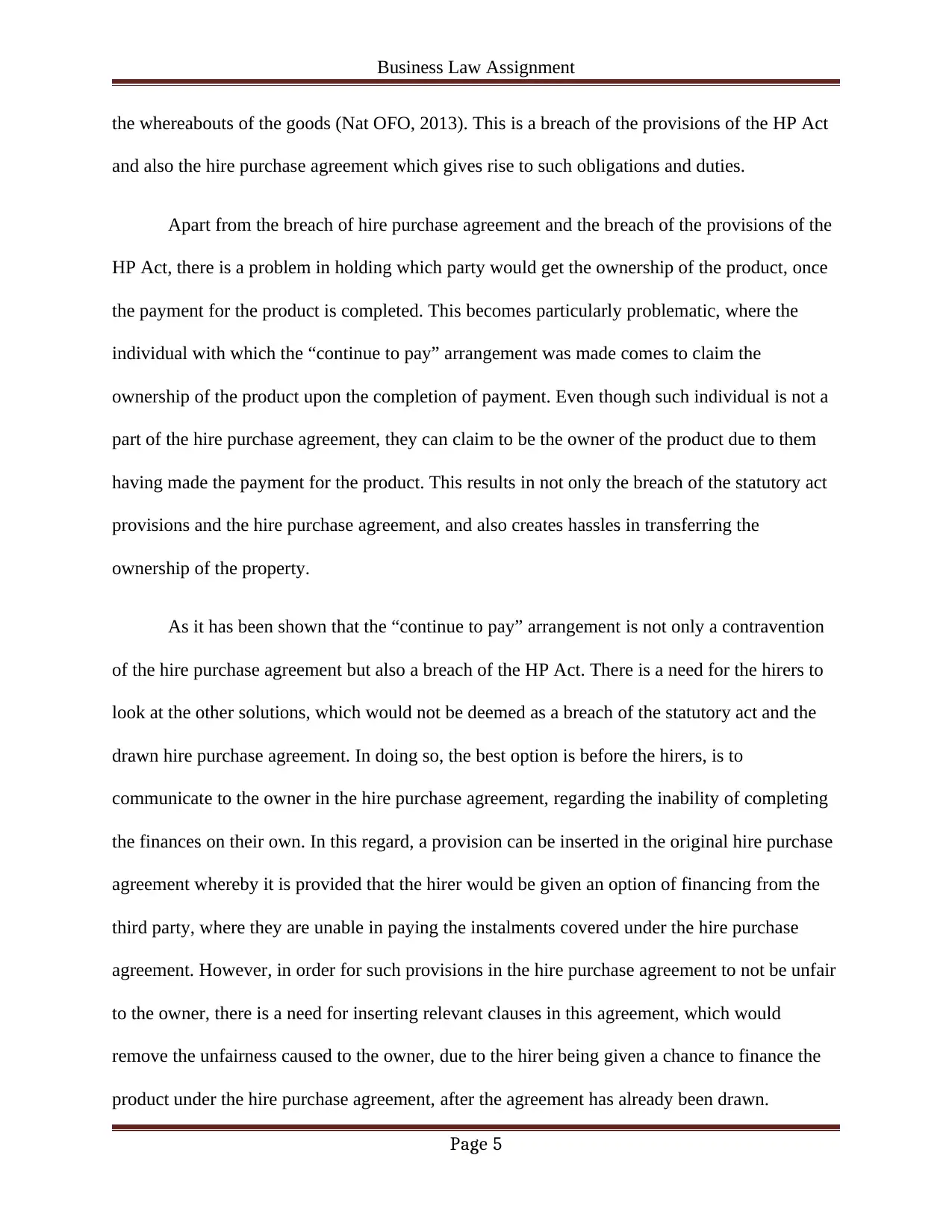
Business Law Assignment
the whereabouts of the goods (Nat OFO, 2013). This is a breach of the provisions of the HP Act
and also the hire purchase agreement which gives rise to such obligations and duties.
Apart from the breach of hire purchase agreement and the breach of the provisions of the
HP Act, there is a problem in holding which party would get the ownership of the product, once
the payment for the product is completed. This becomes particularly problematic, where the
individual with which the “continue to pay” arrangement was made comes to claim the
ownership of the product upon the completion of payment. Even though such individual is not a
part of the hire purchase agreement, they can claim to be the owner of the product due to them
having made the payment for the product. This results in not only the breach of the statutory act
provisions and the hire purchase agreement, and also creates hassles in transferring the
ownership of the property.
As it has been shown that the “continue to pay” arrangement is not only a contravention
of the hire purchase agreement but also a breach of the HP Act. There is a need for the hirers to
look at the other solutions, which would not be deemed as a breach of the statutory act and the
drawn hire purchase agreement. In doing so, the best option is before the hirers, is to
communicate to the owner in the hire purchase agreement, regarding the inability of completing
the finances on their own. In this regard, a provision can be inserted in the original hire purchase
agreement whereby it is provided that the hirer would be given an option of financing from the
third party, where they are unable in paying the instalments covered under the hire purchase
agreement. However, in order for such provisions in the hire purchase agreement to not be unfair
to the owner, there is a need for inserting relevant clauses in this agreement, which would
remove the unfairness caused to the owner, due to the hirer being given a chance to finance the
product under the hire purchase agreement, after the agreement has already been drawn.
Page 5
the whereabouts of the goods (Nat OFO, 2013). This is a breach of the provisions of the HP Act
and also the hire purchase agreement which gives rise to such obligations and duties.
Apart from the breach of hire purchase agreement and the breach of the provisions of the
HP Act, there is a problem in holding which party would get the ownership of the product, once
the payment for the product is completed. This becomes particularly problematic, where the
individual with which the “continue to pay” arrangement was made comes to claim the
ownership of the product upon the completion of payment. Even though such individual is not a
part of the hire purchase agreement, they can claim to be the owner of the product due to them
having made the payment for the product. This results in not only the breach of the statutory act
provisions and the hire purchase agreement, and also creates hassles in transferring the
ownership of the property.
As it has been shown that the “continue to pay” arrangement is not only a contravention
of the hire purchase agreement but also a breach of the HP Act. There is a need for the hirers to
look at the other solutions, which would not be deemed as a breach of the statutory act and the
drawn hire purchase agreement. In doing so, the best option is before the hirers, is to
communicate to the owner in the hire purchase agreement, regarding the inability of completing
the finances on their own. In this regard, a provision can be inserted in the original hire purchase
agreement whereby it is provided that the hirer would be given an option of financing from the
third party, where they are unable in paying the instalments covered under the hire purchase
agreement. However, in order for such provisions in the hire purchase agreement to not be unfair
to the owner, there is a need for inserting relevant clauses in this agreement, which would
remove the unfairness caused to the owner, due to the hirer being given a chance to finance the
product under the hire purchase agreement, after the agreement has already been drawn.
Page 5
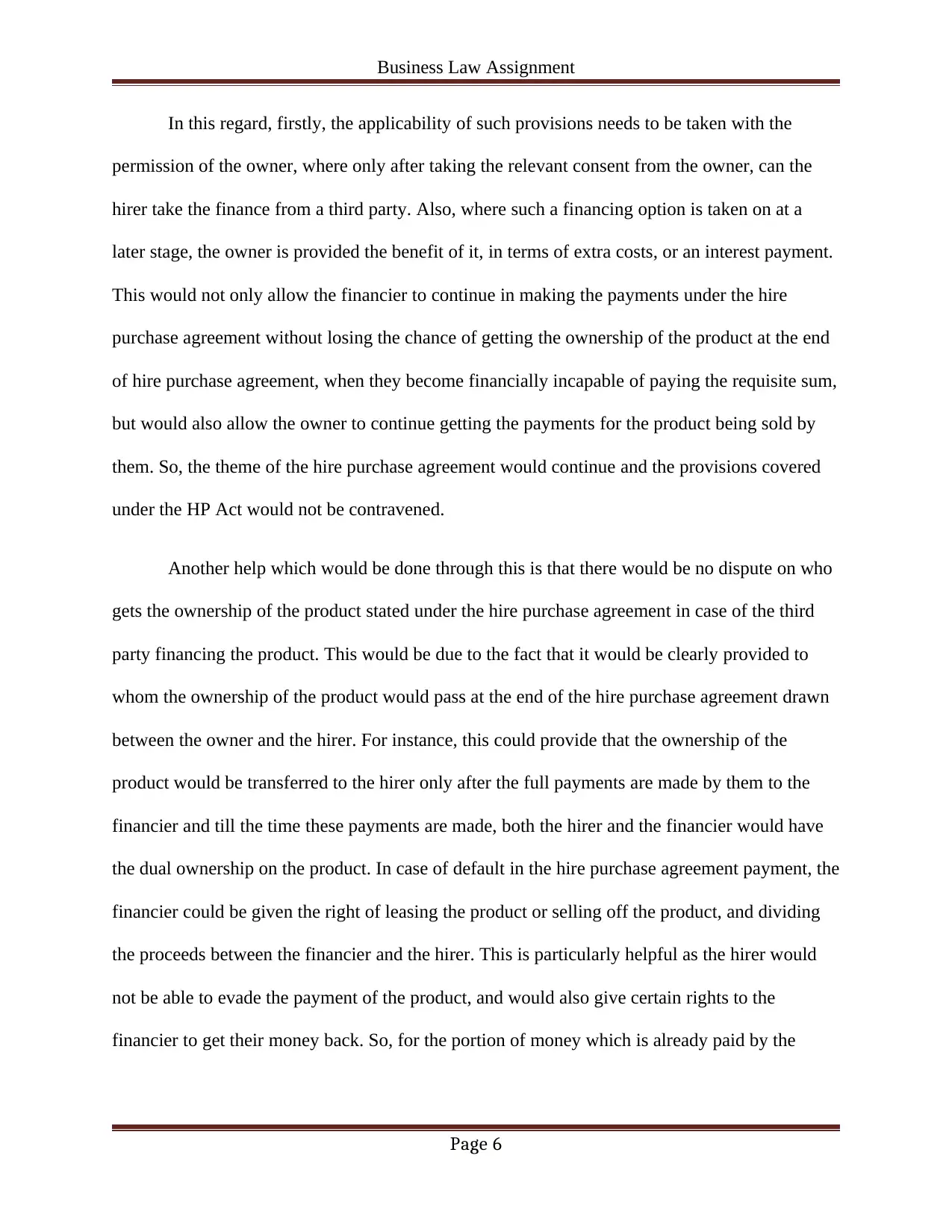
Business Law Assignment
In this regard, firstly, the applicability of such provisions needs to be taken with the
permission of the owner, where only after taking the relevant consent from the owner, can the
hirer take the finance from a third party. Also, where such a financing option is taken on at a
later stage, the owner is provided the benefit of it, in terms of extra costs, or an interest payment.
This would not only allow the financier to continue in making the payments under the hire
purchase agreement without losing the chance of getting the ownership of the product at the end
of hire purchase agreement, when they become financially incapable of paying the requisite sum,
but would also allow the owner to continue getting the payments for the product being sold by
them. So, the theme of the hire purchase agreement would continue and the provisions covered
under the HP Act would not be contravened.
Another help which would be done through this is that there would be no dispute on who
gets the ownership of the product stated under the hire purchase agreement in case of the third
party financing the product. This would be due to the fact that it would be clearly provided to
whom the ownership of the product would pass at the end of the hire purchase agreement drawn
between the owner and the hirer. For instance, this could provide that the ownership of the
product would be transferred to the hirer only after the full payments are made by them to the
financier and till the time these payments are made, both the hirer and the financier would have
the dual ownership on the product. In case of default in the hire purchase agreement payment, the
financier could be given the right of leasing the product or selling off the product, and dividing
the proceeds between the financier and the hirer. This is particularly helpful as the hirer would
not be able to evade the payment of the product, and would also give certain rights to the
financier to get their money back. So, for the portion of money which is already paid by the
Page 6
In this regard, firstly, the applicability of such provisions needs to be taken with the
permission of the owner, where only after taking the relevant consent from the owner, can the
hirer take the finance from a third party. Also, where such a financing option is taken on at a
later stage, the owner is provided the benefit of it, in terms of extra costs, or an interest payment.
This would not only allow the financier to continue in making the payments under the hire
purchase agreement without losing the chance of getting the ownership of the product at the end
of hire purchase agreement, when they become financially incapable of paying the requisite sum,
but would also allow the owner to continue getting the payments for the product being sold by
them. So, the theme of the hire purchase agreement would continue and the provisions covered
under the HP Act would not be contravened.
Another help which would be done through this is that there would be no dispute on who
gets the ownership of the product stated under the hire purchase agreement in case of the third
party financing the product. This would be due to the fact that it would be clearly provided to
whom the ownership of the product would pass at the end of the hire purchase agreement drawn
between the owner and the hirer. For instance, this could provide that the ownership of the
product would be transferred to the hirer only after the full payments are made by them to the
financier and till the time these payments are made, both the hirer and the financier would have
the dual ownership on the product. In case of default in the hire purchase agreement payment, the
financier could be given the right of leasing the product or selling off the product, and dividing
the proceeds between the financier and the hirer. This is particularly helpful as the hirer would
not be able to evade the payment of the product, and would also give certain rights to the
financier to get their money back. So, for the portion of money which is already paid by the
Page 6
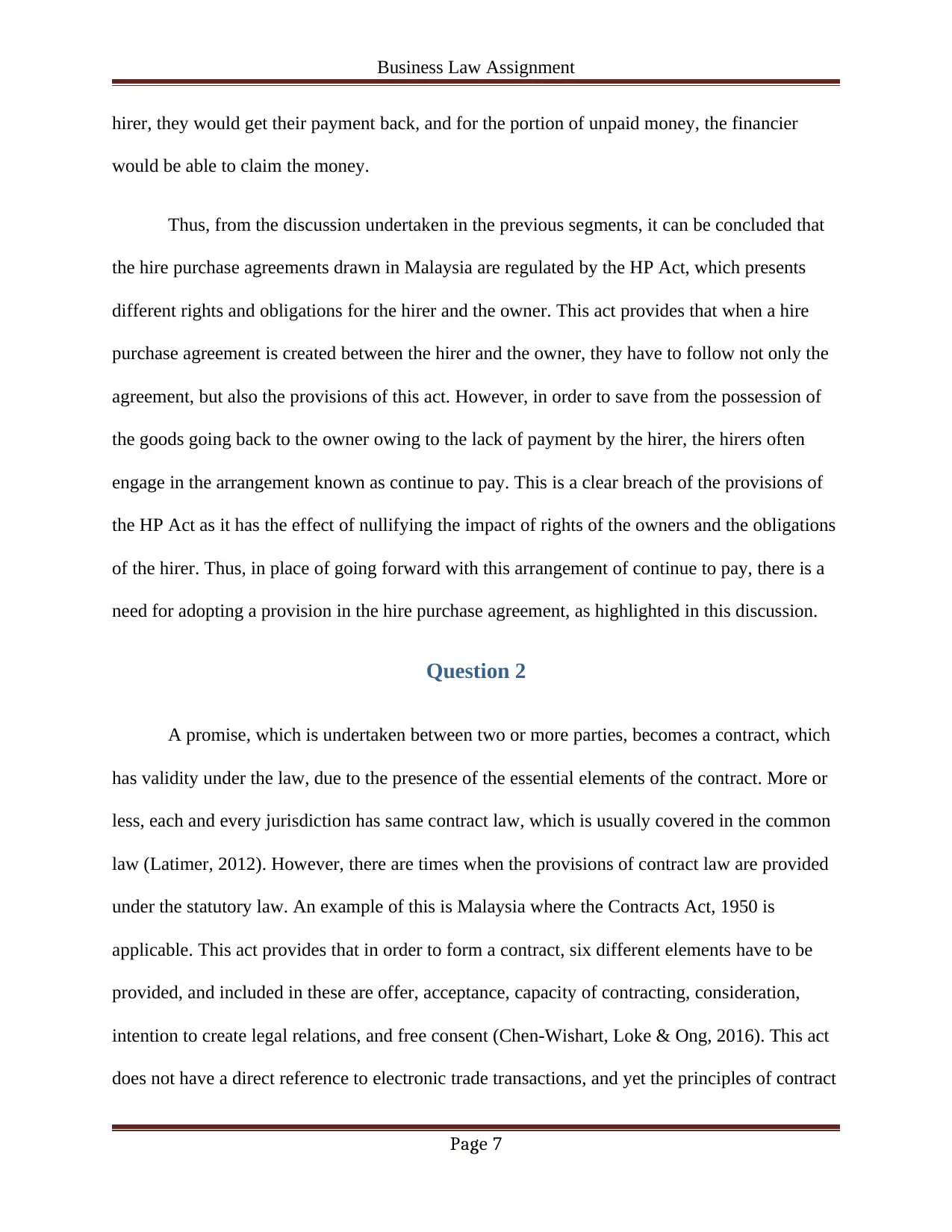
Business Law Assignment
hirer, they would get their payment back, and for the portion of unpaid money, the financier
would be able to claim the money.
Thus, from the discussion undertaken in the previous segments, it can be concluded that
the hire purchase agreements drawn in Malaysia are regulated by the HP Act, which presents
different rights and obligations for the hirer and the owner. This act provides that when a hire
purchase agreement is created between the hirer and the owner, they have to follow not only the
agreement, but also the provisions of this act. However, in order to save from the possession of
the goods going back to the owner owing to the lack of payment by the hirer, the hirers often
engage in the arrangement known as continue to pay. This is a clear breach of the provisions of
the HP Act as it has the effect of nullifying the impact of rights of the owners and the obligations
of the hirer. Thus, in place of going forward with this arrangement of continue to pay, there is a
need for adopting a provision in the hire purchase agreement, as highlighted in this discussion.
Question 2
A promise, which is undertaken between two or more parties, becomes a contract, which
has validity under the law, due to the presence of the essential elements of the contract. More or
less, each and every jurisdiction has same contract law, which is usually covered in the common
law (Latimer, 2012). However, there are times when the provisions of contract law are provided
under the statutory law. An example of this is Malaysia where the Contracts Act, 1950 is
applicable. This act provides that in order to form a contract, six different elements have to be
provided, and included in these are offer, acceptance, capacity of contracting, consideration,
intention to create legal relations, and free consent (Chen-Wishart, Loke & Ong, 2016). This act
does not have a direct reference to electronic trade transactions, and yet the principles of contract
Page 7
hirer, they would get their payment back, and for the portion of unpaid money, the financier
would be able to claim the money.
Thus, from the discussion undertaken in the previous segments, it can be concluded that
the hire purchase agreements drawn in Malaysia are regulated by the HP Act, which presents
different rights and obligations for the hirer and the owner. This act provides that when a hire
purchase agreement is created between the hirer and the owner, they have to follow not only the
agreement, but also the provisions of this act. However, in order to save from the possession of
the goods going back to the owner owing to the lack of payment by the hirer, the hirers often
engage in the arrangement known as continue to pay. This is a clear breach of the provisions of
the HP Act as it has the effect of nullifying the impact of rights of the owners and the obligations
of the hirer. Thus, in place of going forward with this arrangement of continue to pay, there is a
need for adopting a provision in the hire purchase agreement, as highlighted in this discussion.
Question 2
A promise, which is undertaken between two or more parties, becomes a contract, which
has validity under the law, due to the presence of the essential elements of the contract. More or
less, each and every jurisdiction has same contract law, which is usually covered in the common
law (Latimer, 2012). However, there are times when the provisions of contract law are provided
under the statutory law. An example of this is Malaysia where the Contracts Act, 1950 is
applicable. This act provides that in order to form a contract, six different elements have to be
provided, and included in these are offer, acceptance, capacity of contracting, consideration,
intention to create legal relations, and free consent (Chen-Wishart, Loke & Ong, 2016). This act
does not have a direct reference to electronic trade transactions, and yet the principles of contract
Page 7
Paraphrase This Document
Need a fresh take? Get an instant paraphrase of this document with our AI Paraphraser
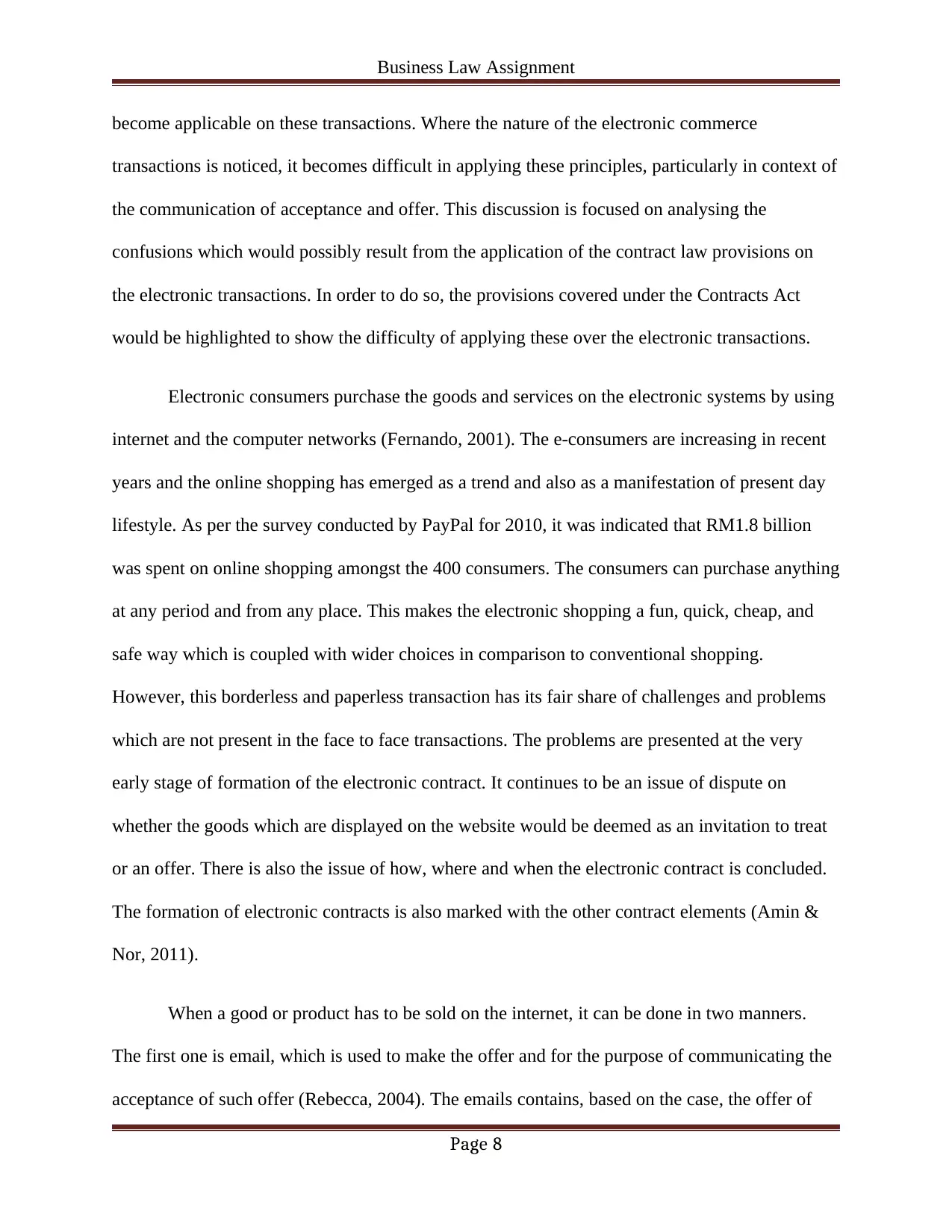
Business Law Assignment
become applicable on these transactions. Where the nature of the electronic commerce
transactions is noticed, it becomes difficult in applying these principles, particularly in context of
the communication of acceptance and offer. This discussion is focused on analysing the
confusions which would possibly result from the application of the contract law provisions on
the electronic transactions. In order to do so, the provisions covered under the Contracts Act
would be highlighted to show the difficulty of applying these over the electronic transactions.
Electronic consumers purchase the goods and services on the electronic systems by using
internet and the computer networks (Fernando, 2001). The e-consumers are increasing in recent
years and the online shopping has emerged as a trend and also as a manifestation of present day
lifestyle. As per the survey conducted by PayPal for 2010, it was indicated that RM1.8 billion
was spent on online shopping amongst the 400 consumers. The consumers can purchase anything
at any period and from any place. This makes the electronic shopping a fun, quick, cheap, and
safe way which is coupled with wider choices in comparison to conventional shopping.
However, this borderless and paperless transaction has its fair share of challenges and problems
which are not present in the face to face transactions. The problems are presented at the very
early stage of formation of the electronic contract. It continues to be an issue of dispute on
whether the goods which are displayed on the website would be deemed as an invitation to treat
or an offer. There is also the issue of how, where and when the electronic contract is concluded.
The formation of electronic contracts is also marked with the other contract elements (Amin &
Nor, 2011).
When a good or product has to be sold on the internet, it can be done in two manners.
The first one is email, which is used to make the offer and for the purpose of communicating the
acceptance of such offer (Rebecca, 2004). The emails contains, based on the case, the offer of
Page 8
become applicable on these transactions. Where the nature of the electronic commerce
transactions is noticed, it becomes difficult in applying these principles, particularly in context of
the communication of acceptance and offer. This discussion is focused on analysing the
confusions which would possibly result from the application of the contract law provisions on
the electronic transactions. In order to do so, the provisions covered under the Contracts Act
would be highlighted to show the difficulty of applying these over the electronic transactions.
Electronic consumers purchase the goods and services on the electronic systems by using
internet and the computer networks (Fernando, 2001). The e-consumers are increasing in recent
years and the online shopping has emerged as a trend and also as a manifestation of present day
lifestyle. As per the survey conducted by PayPal for 2010, it was indicated that RM1.8 billion
was spent on online shopping amongst the 400 consumers. The consumers can purchase anything
at any period and from any place. This makes the electronic shopping a fun, quick, cheap, and
safe way which is coupled with wider choices in comparison to conventional shopping.
However, this borderless and paperless transaction has its fair share of challenges and problems
which are not present in the face to face transactions. The problems are presented at the very
early stage of formation of the electronic contract. It continues to be an issue of dispute on
whether the goods which are displayed on the website would be deemed as an invitation to treat
or an offer. There is also the issue of how, where and when the electronic contract is concluded.
The formation of electronic contracts is also marked with the other contract elements (Amin &
Nor, 2011).
When a good or product has to be sold on the internet, it can be done in two manners.
The first one is email, which is used to make the offer and for the purpose of communicating the
acceptance of such offer (Rebecca, 2004). The emails contains, based on the case, the offer of
Page 8
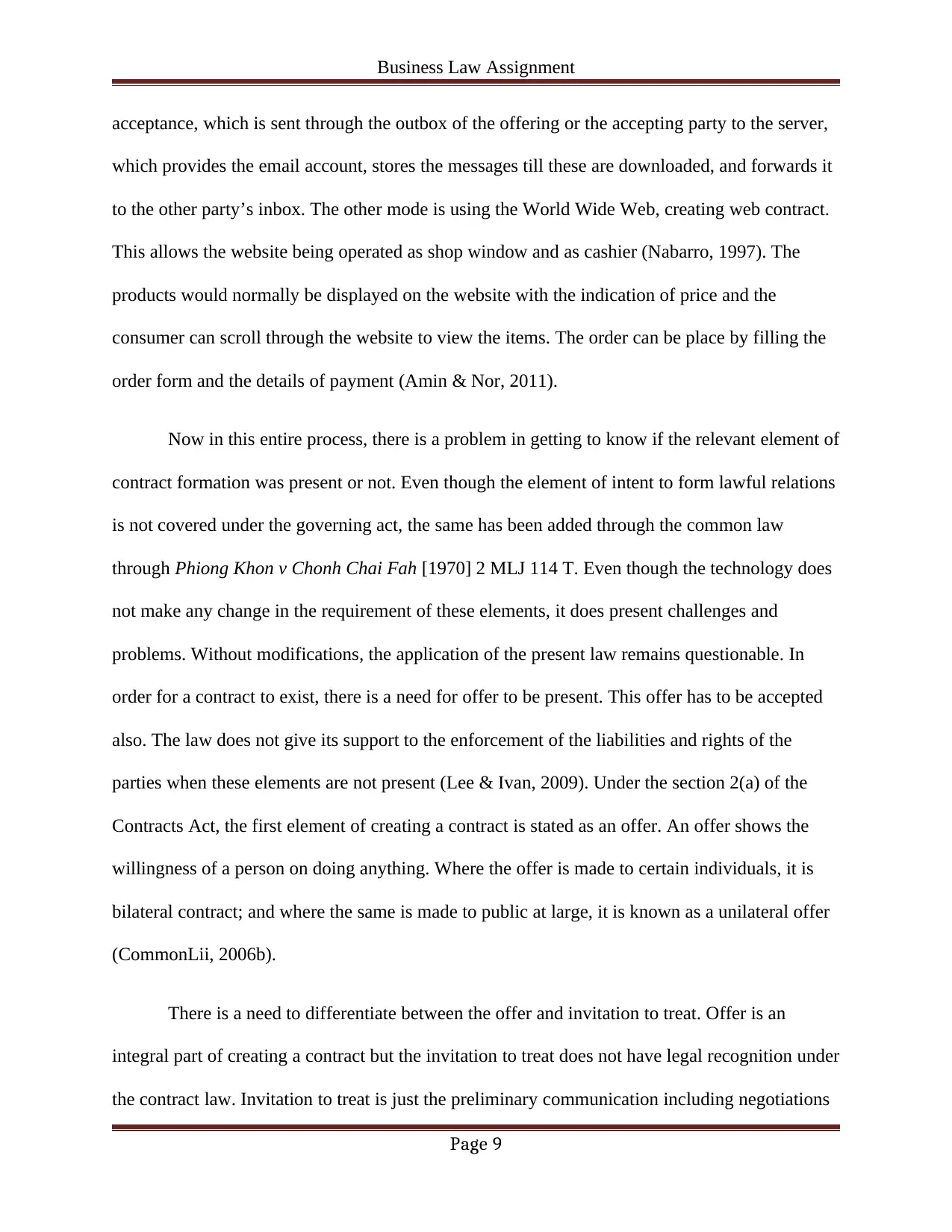
Business Law Assignment
acceptance, which is sent through the outbox of the offering or the accepting party to the server,
which provides the email account, stores the messages till these are downloaded, and forwards it
to the other party’s inbox. The other mode is using the World Wide Web, creating web contract.
This allows the website being operated as shop window and as cashier (Nabarro, 1997). The
products would normally be displayed on the website with the indication of price and the
consumer can scroll through the website to view the items. The order can be place by filling the
order form and the details of payment (Amin & Nor, 2011).
Now in this entire process, there is a problem in getting to know if the relevant element of
contract formation was present or not. Even though the element of intent to form lawful relations
is not covered under the governing act, the same has been added through the common law
through Phiong Khon v Chonh Chai Fah [1970] 2 MLJ 114 T. Even though the technology does
not make any change in the requirement of these elements, it does present challenges and
problems. Without modifications, the application of the present law remains questionable. In
order for a contract to exist, there is a need for offer to be present. This offer has to be accepted
also. The law does not give its support to the enforcement of the liabilities and rights of the
parties when these elements are not present (Lee & Ivan, 2009). Under the section 2(a) of the
Contracts Act, the first element of creating a contract is stated as an offer. An offer shows the
willingness of a person on doing anything. Where the offer is made to certain individuals, it is
bilateral contract; and where the same is made to public at large, it is known as a unilateral offer
(CommonLii, 2006b).
There is a need to differentiate between the offer and invitation to treat. Offer is an
integral part of creating a contract but the invitation to treat does not have legal recognition under
the contract law. Invitation to treat is just the preliminary communication including negotiations
Page 9
acceptance, which is sent through the outbox of the offering or the accepting party to the server,
which provides the email account, stores the messages till these are downloaded, and forwards it
to the other party’s inbox. The other mode is using the World Wide Web, creating web contract.
This allows the website being operated as shop window and as cashier (Nabarro, 1997). The
products would normally be displayed on the website with the indication of price and the
consumer can scroll through the website to view the items. The order can be place by filling the
order form and the details of payment (Amin & Nor, 2011).
Now in this entire process, there is a problem in getting to know if the relevant element of
contract formation was present or not. Even though the element of intent to form lawful relations
is not covered under the governing act, the same has been added through the common law
through Phiong Khon v Chonh Chai Fah [1970] 2 MLJ 114 T. Even though the technology does
not make any change in the requirement of these elements, it does present challenges and
problems. Without modifications, the application of the present law remains questionable. In
order for a contract to exist, there is a need for offer to be present. This offer has to be accepted
also. The law does not give its support to the enforcement of the liabilities and rights of the
parties when these elements are not present (Lee & Ivan, 2009). Under the section 2(a) of the
Contracts Act, the first element of creating a contract is stated as an offer. An offer shows the
willingness of a person on doing anything. Where the offer is made to certain individuals, it is
bilateral contract; and where the same is made to public at large, it is known as a unilateral offer
(CommonLii, 2006b).
There is a need to differentiate between the offer and invitation to treat. Offer is an
integral part of creating a contract but the invitation to treat does not have legal recognition under
the contract law. Invitation to treat is just the preliminary communication including negotiations
Page 9
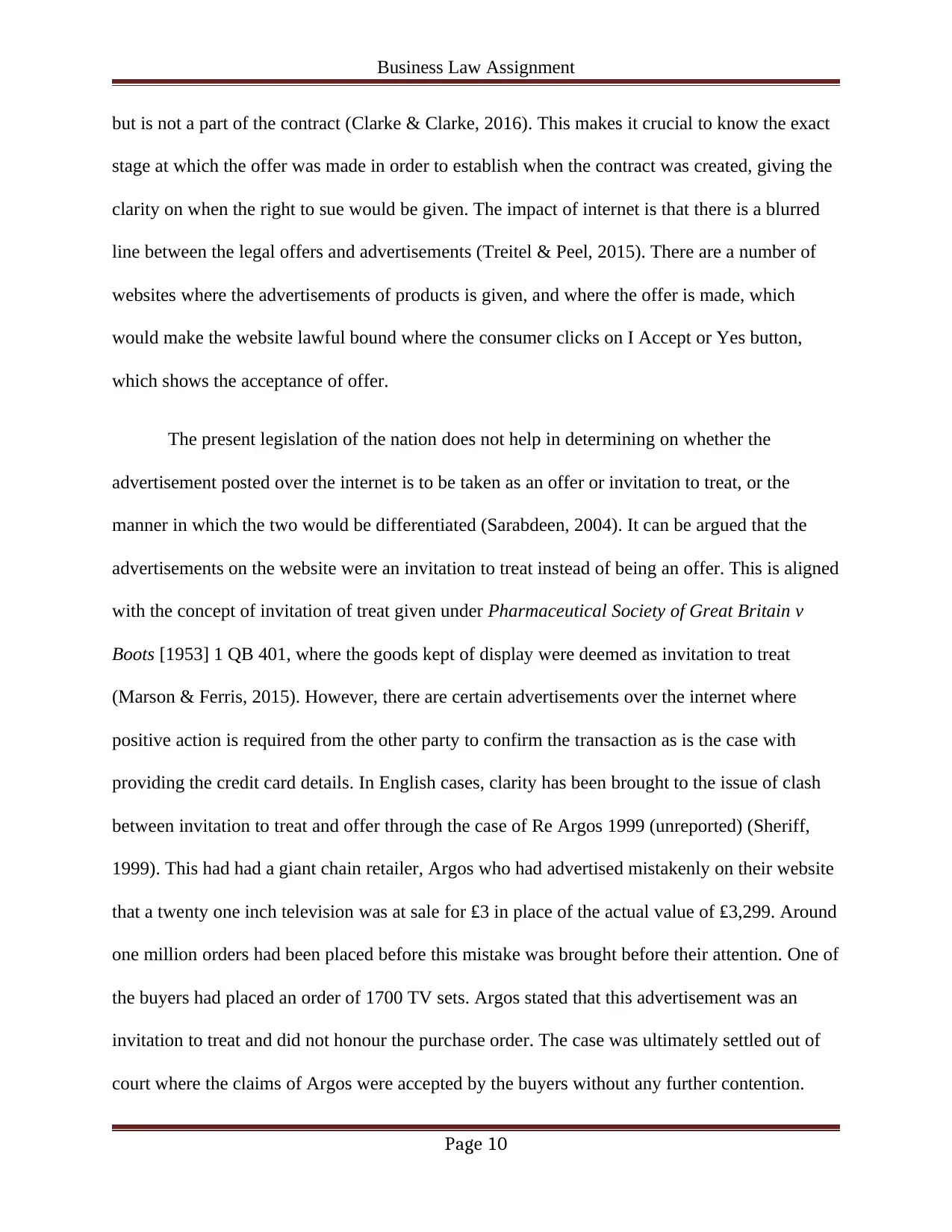
Business Law Assignment
but is not a part of the contract (Clarke & Clarke, 2016). This makes it crucial to know the exact
stage at which the offer was made in order to establish when the contract was created, giving the
clarity on when the right to sue would be given. The impact of internet is that there is a blurred
line between the legal offers and advertisements (Treitel & Peel, 2015). There are a number of
websites where the advertisements of products is given, and where the offer is made, which
would make the website lawful bound where the consumer clicks on I Accept or Yes button,
which shows the acceptance of offer.
The present legislation of the nation does not help in determining on whether the
advertisement posted over the internet is to be taken as an offer or invitation to treat, or the
manner in which the two would be differentiated (Sarabdeen, 2004). It can be argued that the
advertisements on the website were an invitation to treat instead of being an offer. This is aligned
with the concept of invitation of treat given under Pharmaceutical Society of Great Britain v
Boots [1953] 1 QB 401, where the goods kept of display were deemed as invitation to treat
(Marson & Ferris, 2015). However, there are certain advertisements over the internet where
positive action is required from the other party to confirm the transaction as is the case with
providing the credit card details. In English cases, clarity has been brought to the issue of clash
between invitation to treat and offer through the case of Re Argos 1999 (unreported) (Sheriff,
1999). This had had a giant chain retailer, Argos who had advertised mistakenly on their website
that a twenty one inch television was at sale for ₤3 in place of the actual value of ₤3,299. Around
one million orders had been placed before this mistake was brought before their attention. One of
the buyers had placed an order of 1700 TV sets. Argos stated that this advertisement was an
invitation to treat and did not honour the purchase order. The case was ultimately settled out of
court where the claims of Argos were accepted by the buyers without any further contention.
Page 10
but is not a part of the contract (Clarke & Clarke, 2016). This makes it crucial to know the exact
stage at which the offer was made in order to establish when the contract was created, giving the
clarity on when the right to sue would be given. The impact of internet is that there is a blurred
line between the legal offers and advertisements (Treitel & Peel, 2015). There are a number of
websites where the advertisements of products is given, and where the offer is made, which
would make the website lawful bound where the consumer clicks on I Accept or Yes button,
which shows the acceptance of offer.
The present legislation of the nation does not help in determining on whether the
advertisement posted over the internet is to be taken as an offer or invitation to treat, or the
manner in which the two would be differentiated (Sarabdeen, 2004). It can be argued that the
advertisements on the website were an invitation to treat instead of being an offer. This is aligned
with the concept of invitation of treat given under Pharmaceutical Society of Great Britain v
Boots [1953] 1 QB 401, where the goods kept of display were deemed as invitation to treat
(Marson & Ferris, 2015). However, there are certain advertisements over the internet where
positive action is required from the other party to confirm the transaction as is the case with
providing the credit card details. In English cases, clarity has been brought to the issue of clash
between invitation to treat and offer through the case of Re Argos 1999 (unreported) (Sheriff,
1999). This had had a giant chain retailer, Argos who had advertised mistakenly on their website
that a twenty one inch television was at sale for ₤3 in place of the actual value of ₤3,299. Around
one million orders had been placed before this mistake was brought before their attention. One of
the buyers had placed an order of 1700 TV sets. Argos stated that this advertisement was an
invitation to treat and did not honour the purchase order. The case was ultimately settled out of
court where the claims of Argos were accepted by the buyers without any further contention.
Page 10
Secure Best Marks with AI Grader
Need help grading? Try our AI Grader for instant feedback on your assignments.
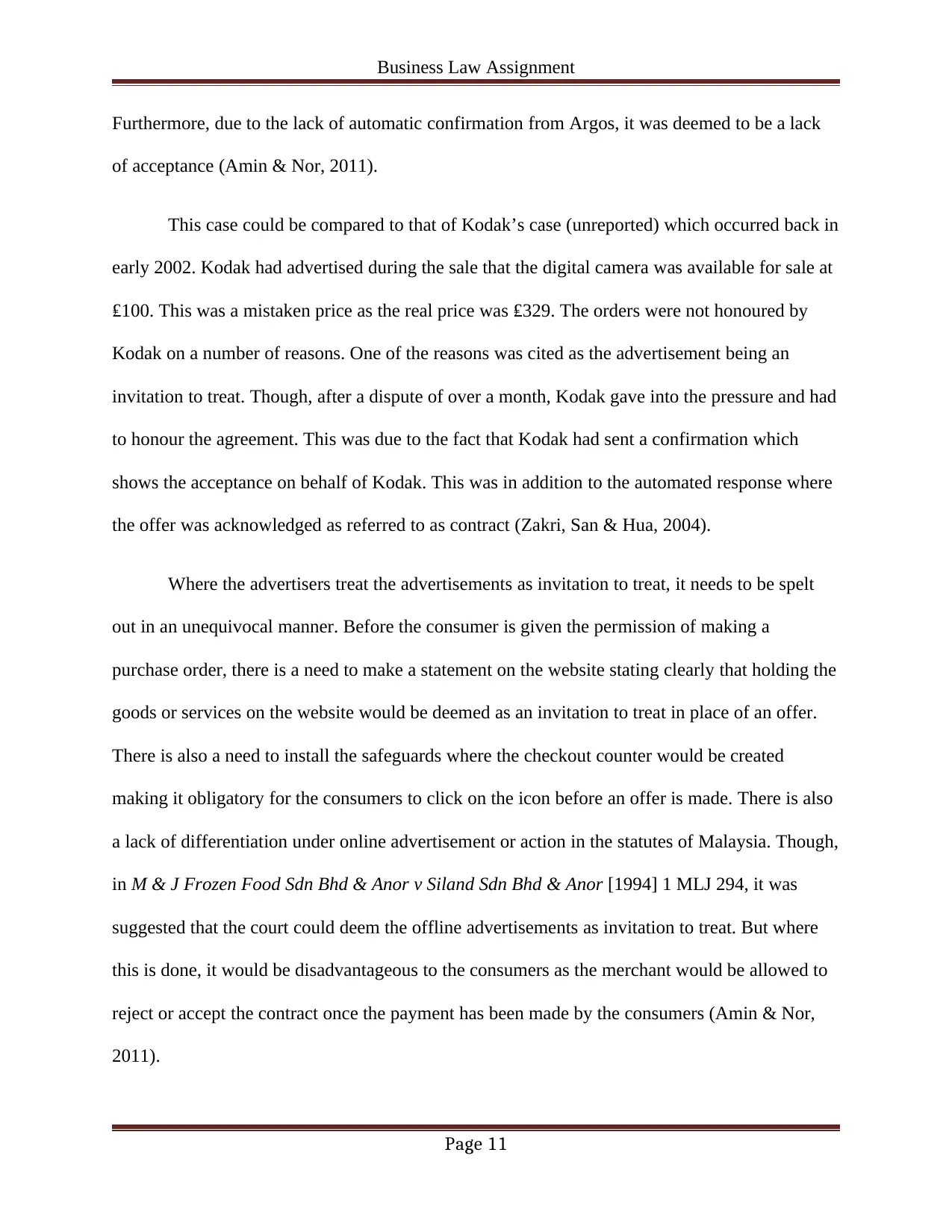
Business Law Assignment
Furthermore, due to the lack of automatic confirmation from Argos, it was deemed to be a lack
of acceptance (Amin & Nor, 2011).
This case could be compared to that of Kodak’s case (unreported) which occurred back in
early 2002. Kodak had advertised during the sale that the digital camera was available for sale at
₤100. This was a mistaken price as the real price was ₤329. The orders were not honoured by
Kodak on a number of reasons. One of the reasons was cited as the advertisement being an
invitation to treat. Though, after a dispute of over a month, Kodak gave into the pressure and had
to honour the agreement. This was due to the fact that Kodak had sent a confirmation which
shows the acceptance on behalf of Kodak. This was in addition to the automated response where
the offer was acknowledged as referred to as contract (Zakri, San & Hua, 2004).
Where the advertisers treat the advertisements as invitation to treat, it needs to be spelt
out in an unequivocal manner. Before the consumer is given the permission of making a
purchase order, there is a need to make a statement on the website stating clearly that holding the
goods or services on the website would be deemed as an invitation to treat in place of an offer.
There is also a need to install the safeguards where the checkout counter would be created
making it obligatory for the consumers to click on the icon before an offer is made. There is also
a lack of differentiation under online advertisement or action in the statutes of Malaysia. Though,
in M & J Frozen Food Sdn Bhd & Anor v Siland Sdn Bhd & Anor [1994] 1 MLJ 294, it was
suggested that the court could deem the offline advertisements as invitation to treat. But where
this is done, it would be disadvantageous to the consumers as the merchant would be allowed to
reject or accept the contract once the payment has been made by the consumers (Amin & Nor,
2011).
Page 11
Furthermore, due to the lack of automatic confirmation from Argos, it was deemed to be a lack
of acceptance (Amin & Nor, 2011).
This case could be compared to that of Kodak’s case (unreported) which occurred back in
early 2002. Kodak had advertised during the sale that the digital camera was available for sale at
₤100. This was a mistaken price as the real price was ₤329. The orders were not honoured by
Kodak on a number of reasons. One of the reasons was cited as the advertisement being an
invitation to treat. Though, after a dispute of over a month, Kodak gave into the pressure and had
to honour the agreement. This was due to the fact that Kodak had sent a confirmation which
shows the acceptance on behalf of Kodak. This was in addition to the automated response where
the offer was acknowledged as referred to as contract (Zakri, San & Hua, 2004).
Where the advertisers treat the advertisements as invitation to treat, it needs to be spelt
out in an unequivocal manner. Before the consumer is given the permission of making a
purchase order, there is a need to make a statement on the website stating clearly that holding the
goods or services on the website would be deemed as an invitation to treat in place of an offer.
There is also a need to install the safeguards where the checkout counter would be created
making it obligatory for the consumers to click on the icon before an offer is made. There is also
a lack of differentiation under online advertisement or action in the statutes of Malaysia. Though,
in M & J Frozen Food Sdn Bhd & Anor v Siland Sdn Bhd & Anor [1994] 1 MLJ 294, it was
suggested that the court could deem the offline advertisements as invitation to treat. But where
this is done, it would be disadvantageous to the consumers as the merchant would be allowed to
reject or accept the contract once the payment has been made by the consumers (Amin & Nor,
2011).
Page 11
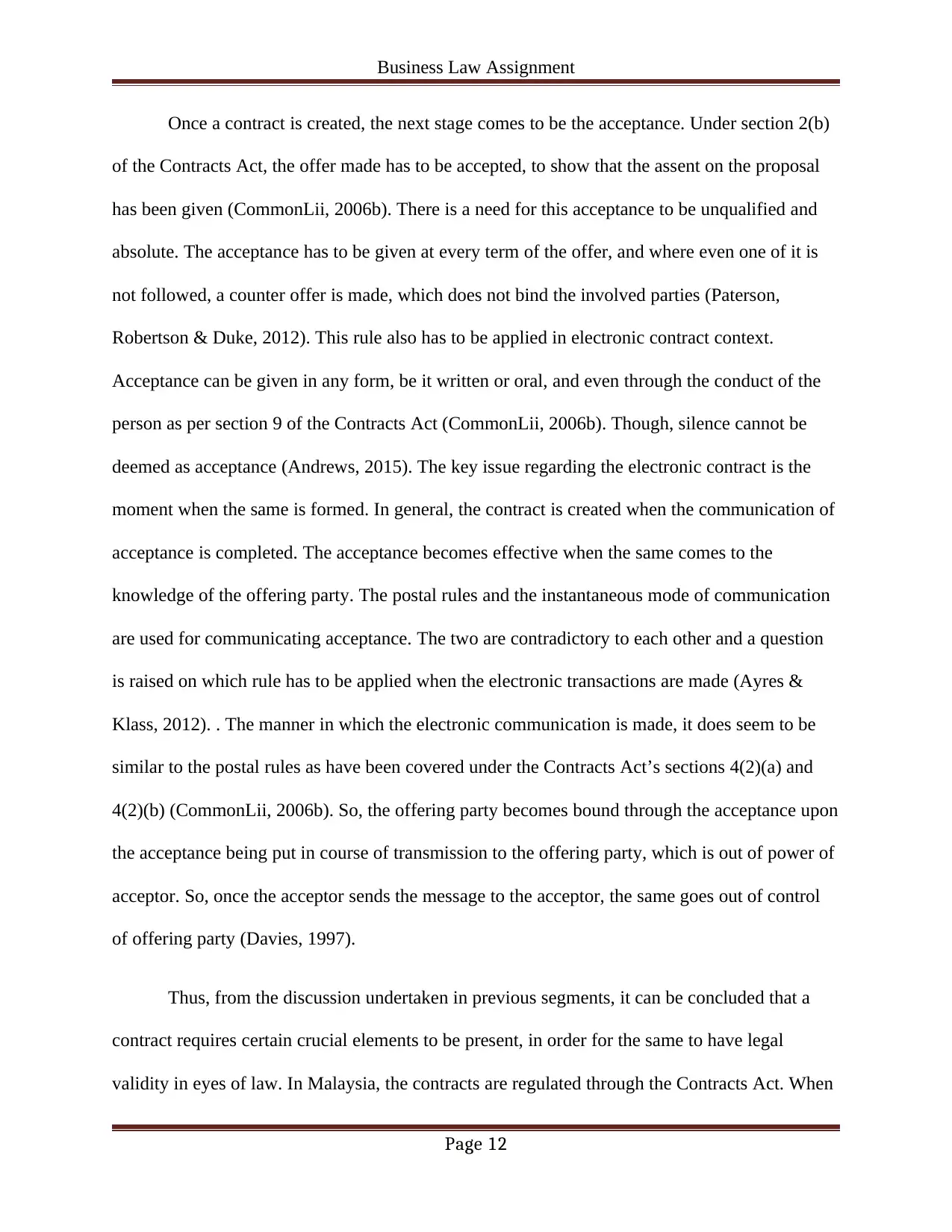
Business Law Assignment
Once a contract is created, the next stage comes to be the acceptance. Under section 2(b)
of the Contracts Act, the offer made has to be accepted, to show that the assent on the proposal
has been given (CommonLii, 2006b). There is a need for this acceptance to be unqualified and
absolute. The acceptance has to be given at every term of the offer, and where even one of it is
not followed, a counter offer is made, which does not bind the involved parties (Paterson,
Robertson & Duke, 2012). This rule also has to be applied in electronic contract context.
Acceptance can be given in any form, be it written or oral, and even through the conduct of the
person as per section 9 of the Contracts Act (CommonLii, 2006b). Though, silence cannot be
deemed as acceptance (Andrews, 2015). The key issue regarding the electronic contract is the
moment when the same is formed. In general, the contract is created when the communication of
acceptance is completed. The acceptance becomes effective when the same comes to the
knowledge of the offering party. The postal rules and the instantaneous mode of communication
are used for communicating acceptance. The two are contradictory to each other and a question
is raised on which rule has to be applied when the electronic transactions are made (Ayres &
Klass, 2012). . The manner in which the electronic communication is made, it does seem to be
similar to the postal rules as have been covered under the Contracts Act’s sections 4(2)(a) and
4(2)(b) (CommonLii, 2006b). So, the offering party becomes bound through the acceptance upon
the acceptance being put in course of transmission to the offering party, which is out of power of
acceptor. So, once the acceptor sends the message to the acceptor, the same goes out of control
of offering party (Davies, 1997).
Thus, from the discussion undertaken in previous segments, it can be concluded that a
contract requires certain crucial elements to be present, in order for the same to have legal
validity in eyes of law. In Malaysia, the contracts are regulated through the Contracts Act. When
Page 12
Once a contract is created, the next stage comes to be the acceptance. Under section 2(b)
of the Contracts Act, the offer made has to be accepted, to show that the assent on the proposal
has been given (CommonLii, 2006b). There is a need for this acceptance to be unqualified and
absolute. The acceptance has to be given at every term of the offer, and where even one of it is
not followed, a counter offer is made, which does not bind the involved parties (Paterson,
Robertson & Duke, 2012). This rule also has to be applied in electronic contract context.
Acceptance can be given in any form, be it written or oral, and even through the conduct of the
person as per section 9 of the Contracts Act (CommonLii, 2006b). Though, silence cannot be
deemed as acceptance (Andrews, 2015). The key issue regarding the electronic contract is the
moment when the same is formed. In general, the contract is created when the communication of
acceptance is completed. The acceptance becomes effective when the same comes to the
knowledge of the offering party. The postal rules and the instantaneous mode of communication
are used for communicating acceptance. The two are contradictory to each other and a question
is raised on which rule has to be applied when the electronic transactions are made (Ayres &
Klass, 2012). . The manner in which the electronic communication is made, it does seem to be
similar to the postal rules as have been covered under the Contracts Act’s sections 4(2)(a) and
4(2)(b) (CommonLii, 2006b). So, the offering party becomes bound through the acceptance upon
the acceptance being put in course of transmission to the offering party, which is out of power of
acceptor. So, once the acceptor sends the message to the acceptor, the same goes out of control
of offering party (Davies, 1997).
Thus, from the discussion undertaken in previous segments, it can be concluded that a
contract requires certain crucial elements to be present, in order for the same to have legal
validity in eyes of law. In Malaysia, the contracts are regulated through the Contracts Act. When
Page 12
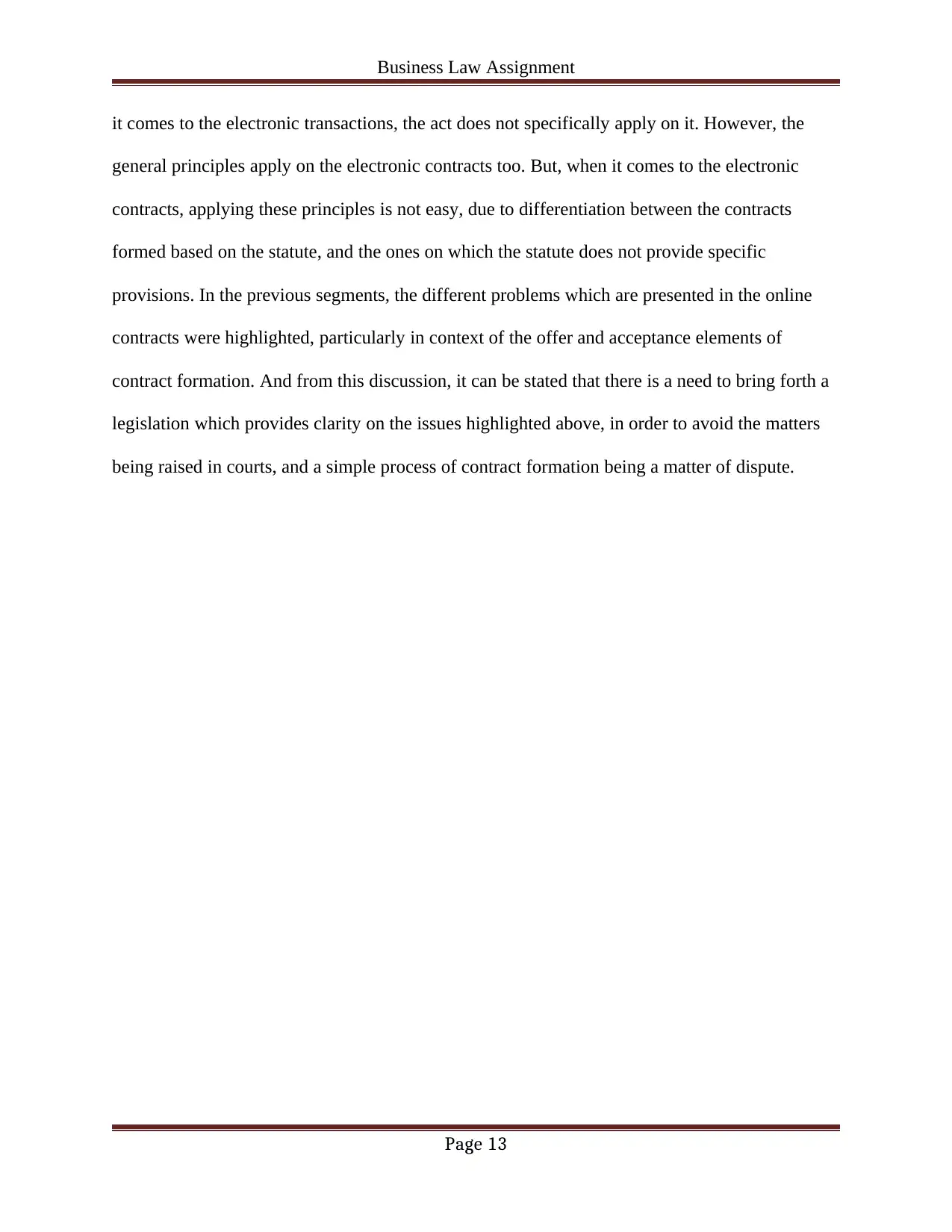
Business Law Assignment
it comes to the electronic transactions, the act does not specifically apply on it. However, the
general principles apply on the electronic contracts too. But, when it comes to the electronic
contracts, applying these principles is not easy, due to differentiation between the contracts
formed based on the statute, and the ones on which the statute does not provide specific
provisions. In the previous segments, the different problems which are presented in the online
contracts were highlighted, particularly in context of the offer and acceptance elements of
contract formation. And from this discussion, it can be stated that there is a need to bring forth a
legislation which provides clarity on the issues highlighted above, in order to avoid the matters
being raised in courts, and a simple process of contract formation being a matter of dispute.
Page 13
it comes to the electronic transactions, the act does not specifically apply on it. However, the
general principles apply on the electronic contracts too. But, when it comes to the electronic
contracts, applying these principles is not easy, due to differentiation between the contracts
formed based on the statute, and the ones on which the statute does not provide specific
provisions. In the previous segments, the different problems which are presented in the online
contracts were highlighted, particularly in context of the offer and acceptance elements of
contract formation. And from this discussion, it can be stated that there is a need to bring forth a
legislation which provides clarity on the issues highlighted above, in order to avoid the matters
being raised in courts, and a simple process of contract formation being a matter of dispute.
Page 13
Paraphrase This Document
Need a fresh take? Get an instant paraphrase of this document with our AI Paraphraser
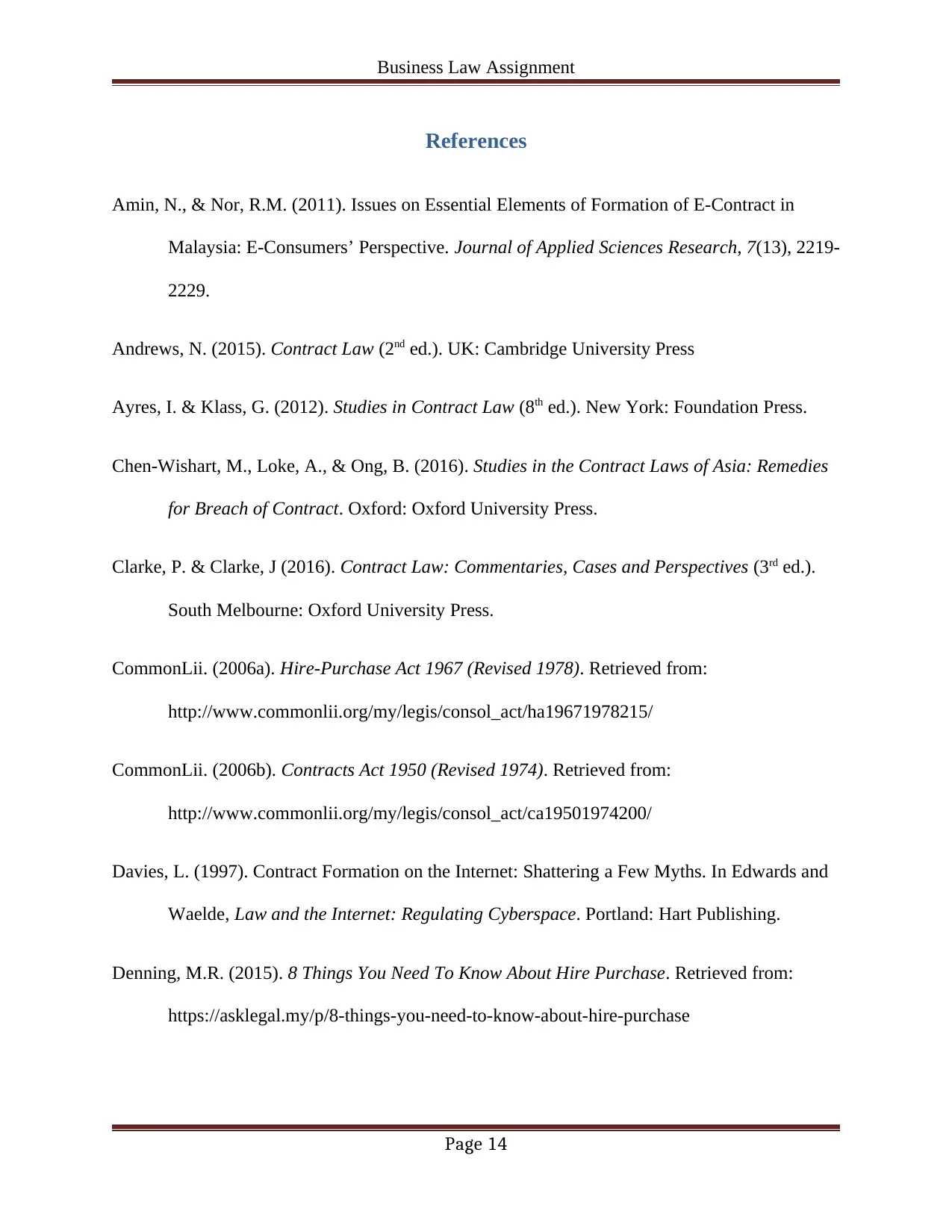
Business Law Assignment
References
Amin, N., & Nor, R.M. (2011). Issues on Essential Elements of Formation of E-Contract in
Malaysia: E-Consumers’ Perspective. Journal of Applied Sciences Research, 7(13), 2219-
2229.
Andrews, N. (2015). Contract Law (2nd ed.). UK: Cambridge University Press
Ayres, I. & Klass, G. (2012). Studies in Contract Law (8th ed.). New York: Foundation Press.
Chen-Wishart, M., Loke, A., & Ong, B. (2016). Studies in the Contract Laws of Asia: Remedies
for Breach of Contract. Oxford: Oxford University Press.
Clarke, P. & Clarke, J (2016). Contract Law: Commentaries, Cases and Perspectives (3rd ed.).
South Melbourne: Oxford University Press.
CommonLii. (2006a). Hire-Purchase Act 1967 (Revised 1978). Retrieved from:
http://www.commonlii.org/my/legis/consol_act/ha19671978215/
CommonLii. (2006b). Contracts Act 1950 (Revised 1974). Retrieved from:
http://www.commonlii.org/my/legis/consol_act/ca19501974200/
Davies, L. (1997). Contract Formation on the Internet: Shattering a Few Myths. In Edwards and
Waelde, Law and the Internet: Regulating Cyberspace. Portland: Hart Publishing.
Denning, M.R. (2015). 8 Things You Need To Know About Hire Purchase. Retrieved from:
https://asklegal.my/p/8-things-you-need-to-know-about-hire-purchase
Page 14
References
Amin, N., & Nor, R.M. (2011). Issues on Essential Elements of Formation of E-Contract in
Malaysia: E-Consumers’ Perspective. Journal of Applied Sciences Research, 7(13), 2219-
2229.
Andrews, N. (2015). Contract Law (2nd ed.). UK: Cambridge University Press
Ayres, I. & Klass, G. (2012). Studies in Contract Law (8th ed.). New York: Foundation Press.
Chen-Wishart, M., Loke, A., & Ong, B. (2016). Studies in the Contract Laws of Asia: Remedies
for Breach of Contract. Oxford: Oxford University Press.
Clarke, P. & Clarke, J (2016). Contract Law: Commentaries, Cases and Perspectives (3rd ed.).
South Melbourne: Oxford University Press.
CommonLii. (2006a). Hire-Purchase Act 1967 (Revised 1978). Retrieved from:
http://www.commonlii.org/my/legis/consol_act/ha19671978215/
CommonLii. (2006b). Contracts Act 1950 (Revised 1974). Retrieved from:
http://www.commonlii.org/my/legis/consol_act/ca19501974200/
Davies, L. (1997). Contract Formation on the Internet: Shattering a Few Myths. In Edwards and
Waelde, Law and the Internet: Regulating Cyberspace. Portland: Hart Publishing.
Denning, M.R. (2015). 8 Things You Need To Know About Hire Purchase. Retrieved from:
https://asklegal.my/p/8-things-you-need-to-know-about-hire-purchase
Page 14
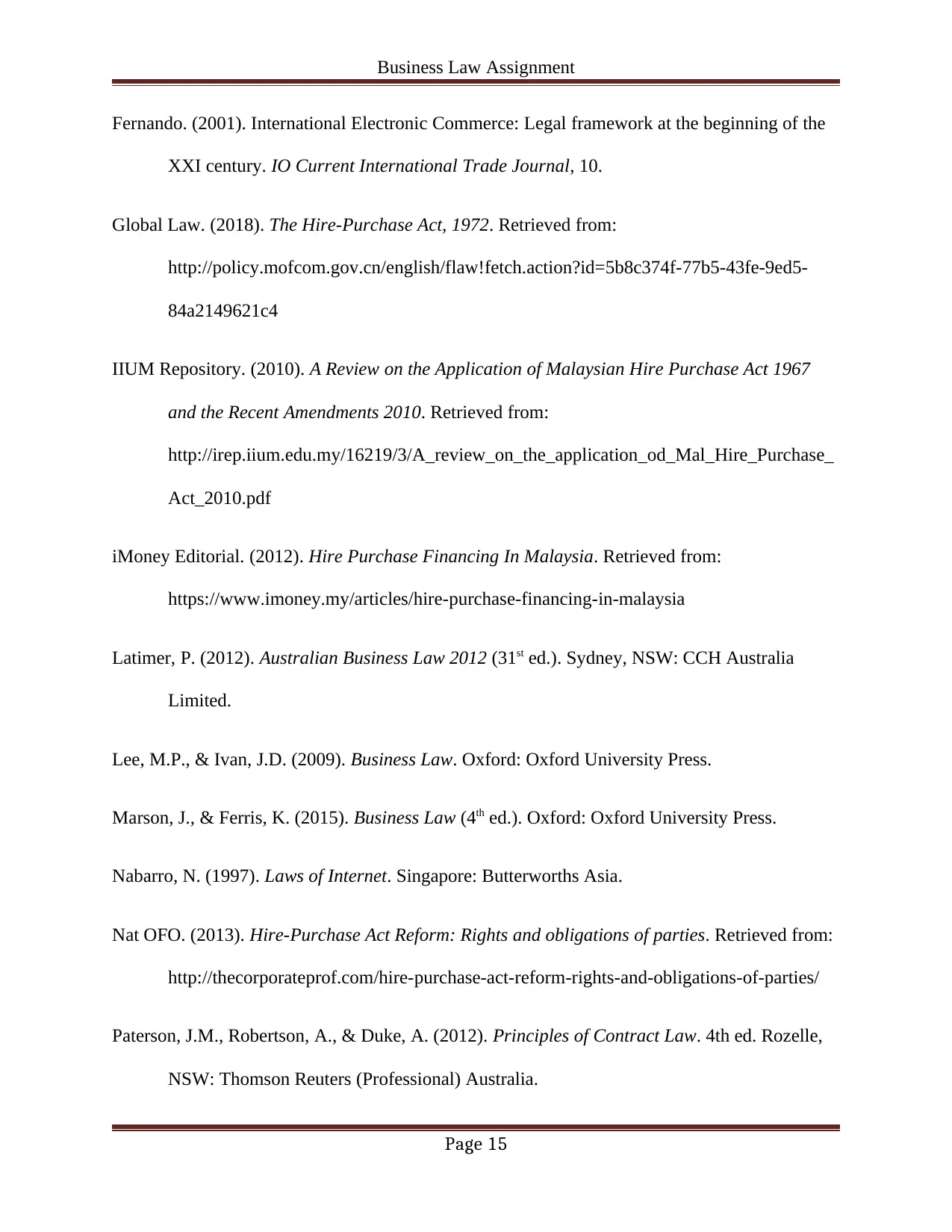
Business Law Assignment
Fernando. (2001). International Electronic Commerce: Legal framework at the beginning of the
XXI century. IO Current International Trade Journal, 10.
Global Law. (2018). The Hire-Purchase Act, 1972. Retrieved from:
http://policy.mofcom.gov.cn/english/flaw!fetch.action?id=5b8c374f-77b5-43fe-9ed5-
84a2149621c4
IIUM Repository. (2010). A Review on the Application of Malaysian Hire Purchase Act 1967
and the Recent Amendments 2010. Retrieved from:
http://irep.iium.edu.my/16219/3/A_review_on_the_application_od_Mal_Hire_Purchase_
Act_2010.pdf
iMoney Editorial. (2012). Hire Purchase Financing In Malaysia. Retrieved from:
https://www.imoney.my/articles/hire-purchase-financing-in-malaysia
Latimer, P. (2012). Australian Business Law 2012 (31st ed.). Sydney, NSW: CCH Australia
Limited.
Lee, M.P., & Ivan, J.D. (2009). Business Law. Oxford: Oxford University Press.
Marson, J., & Ferris, K. (2015). Business Law (4th ed.). Oxford: Oxford University Press.
Nabarro, N. (1997). Laws of Internet. Singapore: Butterworths Asia.
Nat OFO. (2013). Hire-Purchase Act Reform: Rights and obligations of parties. Retrieved from:
http://thecorporateprof.com/hire-purchase-act-reform-rights-and-obligations-of-parties/
Paterson, J.M., Robertson, A., & Duke, A. (2012). Principles of Contract Law. 4th ed. Rozelle,
NSW: Thomson Reuters (Professional) Australia.
Page 15
Fernando. (2001). International Electronic Commerce: Legal framework at the beginning of the
XXI century. IO Current International Trade Journal, 10.
Global Law. (2018). The Hire-Purchase Act, 1972. Retrieved from:
http://policy.mofcom.gov.cn/english/flaw!fetch.action?id=5b8c374f-77b5-43fe-9ed5-
84a2149621c4
IIUM Repository. (2010). A Review on the Application of Malaysian Hire Purchase Act 1967
and the Recent Amendments 2010. Retrieved from:
http://irep.iium.edu.my/16219/3/A_review_on_the_application_od_Mal_Hire_Purchase_
Act_2010.pdf
iMoney Editorial. (2012). Hire Purchase Financing In Malaysia. Retrieved from:
https://www.imoney.my/articles/hire-purchase-financing-in-malaysia
Latimer, P. (2012). Australian Business Law 2012 (31st ed.). Sydney, NSW: CCH Australia
Limited.
Lee, M.P., & Ivan, J.D. (2009). Business Law. Oxford: Oxford University Press.
Marson, J., & Ferris, K. (2015). Business Law (4th ed.). Oxford: Oxford University Press.
Nabarro, N. (1997). Laws of Internet. Singapore: Butterworths Asia.
Nat OFO. (2013). Hire-Purchase Act Reform: Rights and obligations of parties. Retrieved from:
http://thecorporateprof.com/hire-purchase-act-reform-rights-and-obligations-of-parties/
Paterson, J.M., Robertson, A., & Duke, A. (2012). Principles of Contract Law. 4th ed. Rozelle,
NSW: Thomson Reuters (Professional) Australia.
Page 15
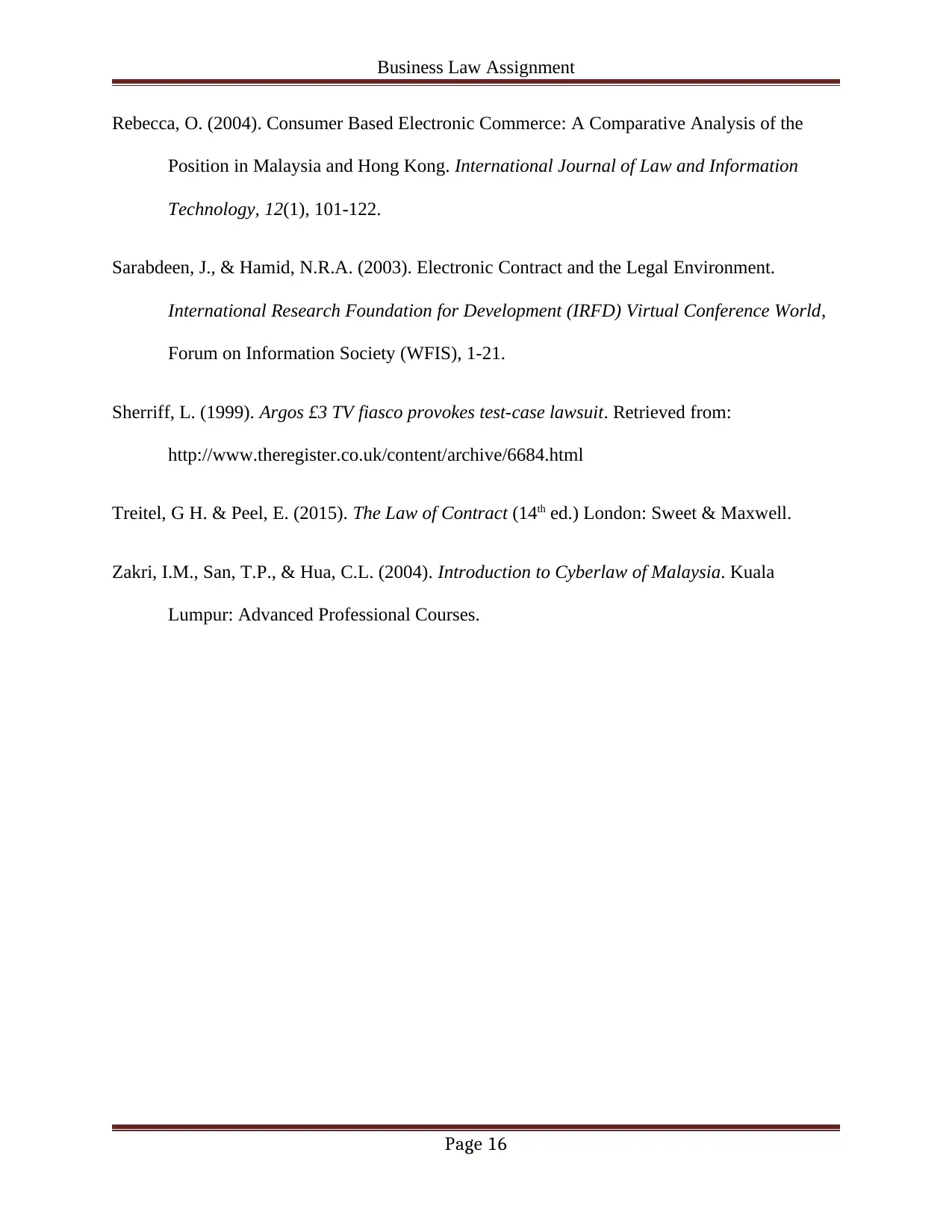
Business Law Assignment
Rebecca, O. (2004). Consumer Based Electronic Commerce: A Comparative Analysis of the
Position in Malaysia and Hong Kong. International Journal of Law and Information
Technology, 12(1), 101-122.
Sarabdeen, J., & Hamid, N.R.A. (2003). Electronic Contract and the Legal Environment.
International Research Foundation for Development (IRFD) Virtual Conference World,
Forum on Information Society (WFIS), 1-21.
Sherriff, L. (1999). Argos £3 TV fiasco provokes test-case lawsuit. Retrieved from:
http://www.theregister.co.uk/content/archive/6684.html
Treitel, G H. & Peel, E. (2015). The Law of Contract (14th ed.) London: Sweet & Maxwell.
Zakri, I.M., San, T.P., & Hua, C.L. (2004). Introduction to Cyberlaw of Malaysia. Kuala
Lumpur: Advanced Professional Courses.
Page 16
Rebecca, O. (2004). Consumer Based Electronic Commerce: A Comparative Analysis of the
Position in Malaysia and Hong Kong. International Journal of Law and Information
Technology, 12(1), 101-122.
Sarabdeen, J., & Hamid, N.R.A. (2003). Electronic Contract and the Legal Environment.
International Research Foundation for Development (IRFD) Virtual Conference World,
Forum on Information Society (WFIS), 1-21.
Sherriff, L. (1999). Argos £3 TV fiasco provokes test-case lawsuit. Retrieved from:
http://www.theregister.co.uk/content/archive/6684.html
Treitel, G H. & Peel, E. (2015). The Law of Contract (14th ed.) London: Sweet & Maxwell.
Zakri, I.M., San, T.P., & Hua, C.L. (2004). Introduction to Cyberlaw of Malaysia. Kuala
Lumpur: Advanced Professional Courses.
Page 16
1 out of 16
Related Documents
Your All-in-One AI-Powered Toolkit for Academic Success.
+13062052269
info@desklib.com
Available 24*7 on WhatsApp / Email
![[object Object]](/_next/static/media/star-bottom.7253800d.svg)
Unlock your academic potential
© 2024 | Zucol Services PVT LTD | All rights reserved.




